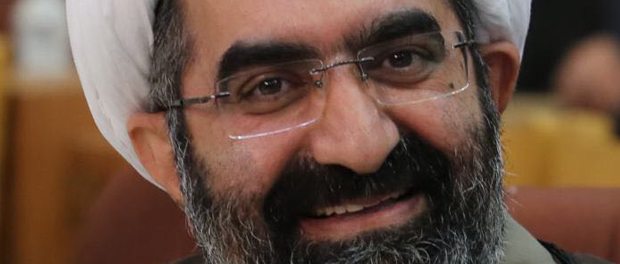Before coming to London in the mid-1990s to establish the Islamic College, Dr Elmi studied Islamic philosophy, ‘Irfan, Islamic jurisprudence, and Quranic sciences at the Hawza of Qum under such luminaries as Ayatollah Mirza Javad Tabrizi, Ayatollah Abdollah Javadi Amoli and Ayatollah Hossein Wahid Khorasani.
His areas of expertise and interest included Islamic philosophy, interpretation of the Qur’an, and modern Islamic thought.
He also served as the Director of Islamic Thought Foundation (Bonyad-i Andisheh Islami) in Tehran in the early 1990s and was influential in increasing the quantity and enhancing the quality of the English magazines published by that foundation, including the Echo of Islam magazine.
Dr. Elmi completed his PhD at the University of Birmingham with an exposition of the philosophical hermeneutics of ‘Allama Muhammad Husayn Tabataba’i, the renowned Shi‘a philosopher and exegete.
Dr Elmi became the driving force for the nascent Islamic College for Advanced Studies (ICAS) taking it from strength to strength. The institution he established with the help of like-minded colleagues initially offered A-Level courses to Muslim students from different walks of life in north west London. The A-Level programme was offered in conjunction with the College of North West London. Many successful Muslim entrepreneurs and professionals working in London today received their A-Level education in that old listed building on Willesden High Road at the corner of St Andrews Road.
But soon the institution rebranded itself as The Islamic College and expanded its activities to become a fully accredited academic institution offering BA, MA and Professional Doctorate in collaboration with Middlesex University.
Simultaneously with its rapid growth as an academic institution, the College also began offering a Hawza programme in English, recruiting some of the brightest minds in the UK and Europe who, for the most part, now serve as ‘alims, public speakers, TV presenters and religious leaders here and abroad.
Dr Elmi himself taught a number of modules at the College and the Hawza including modules on the Qur’an and hadith sciences, Islamic philosophy and Neo-Mu‘tazilite thought.
He served as the College principal during two periods, from 1998 to 2007 and from December 2011 to 2015. After his first stint as principal, he returned to Iran and served as one of the three editors-in-chief of The Encyclopaedia of the World of Islam (EWI), a mammoth research and translation undertaking that introduced different entries of Danishnamih-yi Jahan-i Islam to the English-speaking world. The entries, published by EWI Press as independent titles, include Politics & Political Parties, Hadith, Sufism, Tafsir, Hawza-yi ‘Ilmyiyya, History and Historiography, Pahlawi Dynasty, Education in Islamic Civilisation, Qur’anic Commentaries, and Muslim Organisations in the Twentieth Century: A Survey.
He also served for a while as Vice-President for Research at the Islamic Culture and Communications Organisation, and as the Vice-Principal for Research and Vice-Principal for Education at Al-Mostafa University.
Dr Elmi also served as the editor-in-chief of the Journal of Shi’a Islamic Studies, the first peer-reviewed journal focusing on research on Shi’a Islam. Among the works that Dr Elmi himself authored are the following:
- Co-author of Fihrist-i Mawzu’i-yi Asfar (A Thematic Index to Mulla Sadra’s al-Hikmah al-Muta’aliyyah fi al-Asfar al-Arba‘ah), Tehran: Hikmat, 1996.
- ‘Word of God & Perception of Man: Divine Revelation & Human Interpretation’, in A Catholic-Shi’a Dialogue: Studies in Theology and Spirituality, ed. A. O’Mahony, W. Peterburs, M. Shomali, London: Fox Communications & Publications, 2003.
- Co-author of Kitabshinasi-yi Jami‘-i Qur’an (A Comprehensive Bibliography of the Qur’an), Tehran: Ministry of Culture and Islamic Guidance, 4 vols. 2003.
- Co-author of ‘Tabataba’i, Allama’ in Encyclopedia of Religion, second edition, general ed. Mircea Eliade, USA, Macmillan Reference Book, 2005.
- ‘The Views of Tabataba’i on Traditions and Occasions of Revelation in Interpreting the Qur’an,’ in Journal of Shi’a Islamic Studies, London: ICAS Press, 2006, vol. 1, no. 1, pp. 47-67.
- ‘Bar-rasi va Naqd-i Nazariyih-yi Fadl al-Rahman dar Baz-Sazi-yi Ijtihad dar Din’ (A Critical Study of Fazlur Rahman’s Views on Religious Reformation in Islam) in Journal of Political Science, Qum: Baqir al-Ulum University Press, Spring 2007, vol 37, pp. 71-124.
Man of Piety and Knowledge
The aim and motto of the institution that Dr Elmi established was ‘Islamic Education in an Islamic Environment’. It is in this institution that during the Salat times at noon all classes are suspended and students and lecturers attend the prayer hall for congregational prayer.
The institution reflects two aspects of the character of the late Dr Elmi himself. He was both a pious man and a man of knowledge, a man concerned with the Hereafter and a man preoccupied with the challenges posed by modern academia to religion.
While being fully grounded in his faith, he kept himself well-informed about what the adversaries of religion wrote in their academic writings. He was well aware of the discussions that aimed at weakening the faith of Muslim academicians and attempted to respond to them in his lectures, discussions and writings.
It was his piety that helped him in his battle with cancer, during the tribulations of chemotherapy when one is suspended between the world of the living and the world of the dead. He accepted his fate without any resentment and spoke of his impending departure from the world of the living with an amazing serenity.
In one of his last encounters with a good friend, with a smile on his face, he intimated that he was ready to go to the next world to be with the Ahlulbayt(as). In one of his last communications three days before he passed away, he wrote:
‘I believe that today or tomorrow might be my last day in this evanescent world (hayat-i fani). I look forward to seeing you in the presence of Divine Justice (bi-omid-i didar dar mahzar-i ‘adl-i ilahi), benefiting from the saving grace and forgiveness of the Lord (wa bahre-mandi az amurzesh wa maghfirat-i Haqq).



